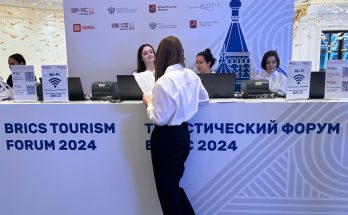
SAMARKAND: Samarkand, one of the oldest cities in the world, rolled out the red carpet for Prime Minister Narendra Modi as he began his visit to attend the eight-nation SCO summit, with terror, trade and connectivity on top of his mind.
“Landed in Samarkand to take part in the SCO Summit,” PM Modi tweeted soon after arrival in the city known as “The Pearl of the East.”

At the airport on the evening of September 15, PM Modi was welcomed by Uzbek counterpart Abdulla Aripov, ministers, Governor of Samarkand region and senior officials. Besides participating in SCO summit meetings on September 16, the highlight of his less than twenty-four hour visit to the Uzbek historic city will be his meeting with Russian President Vladimir Putin. This meeting will be scrutinised closely by the West which has watched warily as India, in an expression of its strategic autonomy, has continued to buy Russian oil despite Western pressure and sanctions.
In talks with President Putin, PM Modi is likely to impress upon the Russian leader the urgent need to resolve the Ukraine crisis with dialogue and diplomacy. The central thrust of the talks will be to firm up a roadmap for steering India-Russia relations in post-Ukraine times, marked by uncertainty and turbulence in world order.
PM Modi will also hold his first in-person bilateral meeting with Iranian President Ebrahim Raisi where the talks will focus finding a way around Western sanctions to continue energy and economic relations.
PM Modi’s meeting with Uzbek leader Shavkat Mirziyoyev will revolve around strengthening bilateral relations, with special focus on enhancing trade and cooperation in emerging areas such as green economy. Ahead of his talks, Modi said in a pre-departure statement that he was looking forward to meeting President Mirziyoyev. “I fondly recall his visit to India in 2018. He also graced the Vibrant Gujarat Summit as Guest of Honour in 2019. In addition, I will hold bilateral meetings with some of the other leaders attending the summit,” Modi said.
“At the SCO Summit, I look forward to exchanging views on topical, regional and international issues, the expansion of SCO and further deepening of multifaceted and mutually beneficial cooperation within the Organisation,” Modi said in a pre-departure statement.
“Under the Uzbek chairship, a number of decisions for mutual cooperation are likely to be adopted in areas of trade, economy, culture and tourism,” he said.
India’s Foreign Secretary Vinay Mohan Kwatara outlined India’s expectations from the Samarkand summit. “We expect that the discussions during the summit would cover topical regional and international issues; reform and expansion of SCO; the security situation in the region; our cooperation perspective in the region including strengthening connectivity as well as boosting trade and tourism in the region,” he told journalists in New Delhi. “Samarkand declaration and numerous other documents are expected to be finalized during the summit. They are currently under consideration of the SCO member countries,” he said.

(Manish Chand is in Samarkand to report on and analyse the SCO summit)
Author Profile

- Manish Chand is Founder-CEO and Editor-in-Chief of India Writes Network (www.indiawrites.org) and India and World, a pioneering magazine focused on international affairs. He is CEO/Director of TGII Media Private Limited, an India-based media, publishing, research and consultancy company.
Latest entries
 India and the WorldJuly 9, 2024Defying West, India sets $100 billion trade target with Russia
India and the WorldJuly 9, 2024Defying West, India sets $100 billion trade target with Russia India and the WorldJuly 5, 2024India at SCO: Takes swipe at Pakistan for cross-border terror, pushes alternative to BRI
India and the WorldJuly 5, 2024India at SCO: Takes swipe at Pakistan for cross-border terror, pushes alternative to BRI India and the WorldJune 14, 2024Modi’s Day 1 in Italy: Bonding with Britain, France
India and the WorldJune 14, 2024Modi’s Day 1 in Italy: Bonding with Britain, France India and the WorldJune 13, 2024G7 summit in Italy: Modi to showcase India as leader of Global South
India and the WorldJune 13, 2024G7 summit in Italy: Modi to showcase India as leader of Global South






